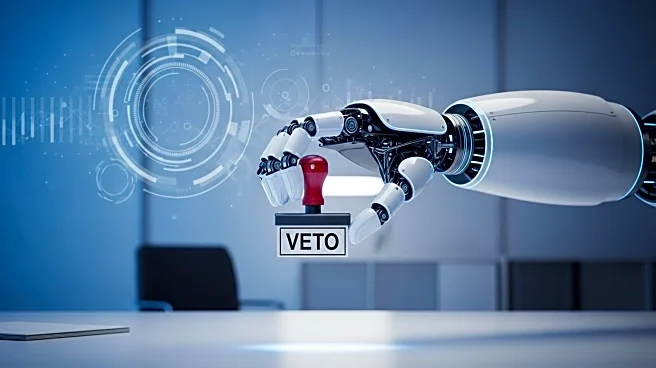What's Happening?
California Governor Gavin Newsom has vetoed the 'No Robo Bosses Act,' a bill aimed at regulating the use of artificial intelligence in employment decisions such as hiring, promotion, discipline, and termination. Introduced by Democratic State Senator Jerry McNerney, the bill sought to impose notification requirements on businesses using AI tools and required employers to inform workers if automated decision-making systems were involved in disciplinary actions. Newsom expressed concerns that the bill was 'unfocused' and 'overly broad,' potentially restricting valuable AI tools for rewarding high-performing employees. He suggested that upcoming regulations from the California Privacy Protection Agency might address some of the bill's intended goals. Newsom has previously vetoed other AI-related legislation, including a bill that would have held tech companies liable for AI-related harm.
Why It's Important?
The veto of the 'No Robo Bosses Act' highlights ongoing debates about the role of artificial intelligence in the workplace and the balance between innovation and regulation. The bill's rejection may impact how businesses in California and potentially across the U.S. approach AI in employment practices. While AI can enhance efficiency and decision-making, concerns about its misuse and lack of transparency remain significant. The decision underscores the need for clear and focused legislation that addresses specific issues without stifling technological advancement. Stakeholders, including employees, employers, and policymakers, are closely watching how AI regulations evolve, as they could set precedents for future laws governing technology in the workplace.
What's Next?
With the veto, attention may shift to the California Privacy Protection Agency's forthcoming regulations, which could address some of the concerns raised by the 'No Robo Bosses Act.' Businesses and advocacy groups are likely to engage in discussions to shape these regulations, aiming for a balance between protecting workers' rights and allowing technological innovation. Additionally, the veto may prompt further legislative efforts to refine AI-related laws, focusing on specific areas of concern such as transparency and accountability in automated decision-making. Employers will need to stay informed about regulatory changes to ensure compliance and adapt their use of AI tools accordingly.
Beyond the Headlines
The veto raises broader questions about the ethical implications of AI in the workplace, including privacy concerns and the potential for bias in automated systems. As AI becomes more integrated into business operations, there is a growing need for ethical guidelines and standards to ensure fair treatment of employees. The development of such standards could influence corporate policies and practices, encouraging a more responsible use of AI technologies. Furthermore, the conversation around AI regulation may contribute to a larger dialogue about the future of work and the role of technology in shaping employment landscapes.










